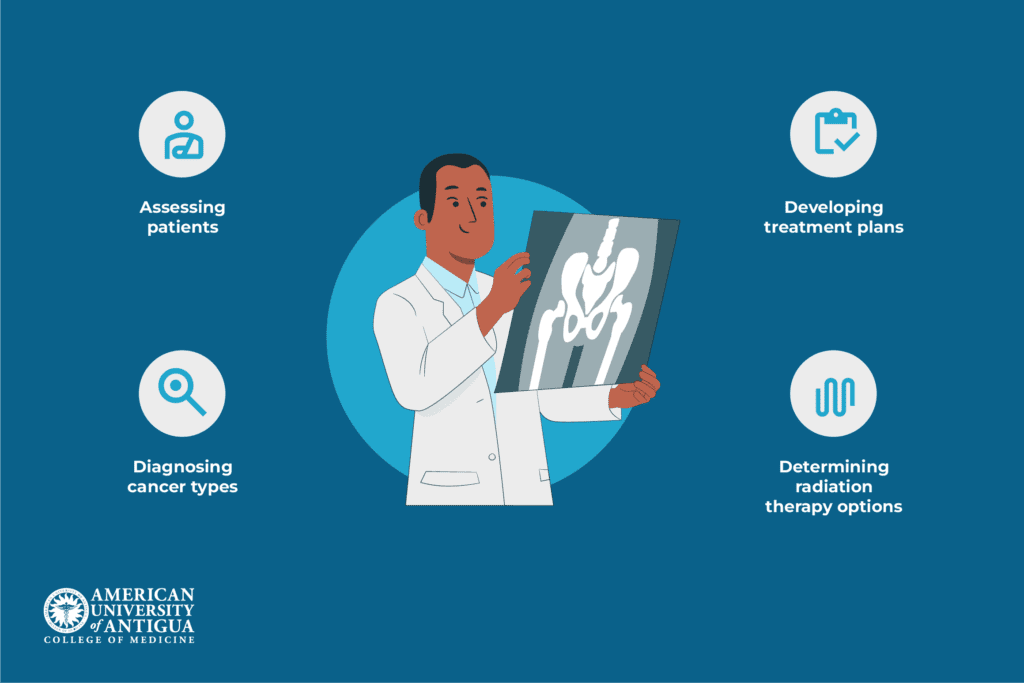Radiation Oncologist: Duties, Skills, and Career Outlook
Key Takeaways
- Radiation oncology is a medical specialty that utilizes radiation therapy to treat cancer and various other conditions.
- A career in radiation oncology offers high earning potential, strong job prospects, and the chance to make a meaningful impact on patients’ lives.
- Success in this field depends on a solid educational background, technical expertise, and strong interpersonal skills.
Cancer continues to be one of the most complex diseases, requiring specialized treatment and care. Oncology, a medical field focused on diagnosing and treating cancer, encompasses different specialties, including radiation oncology.
This branch uses radiation therapy to target and eliminate cancer cells while preserving healthy tissue. Radiation therapy can be used independently or alongside surgery and chemotherapy. Radiation oncologists are vital in developing and delivering these treatments, working with interdisciplinary teams to improve patient outcomes.
✅ Request information on AUA's MD program TODAY!
YOUR PATH TO SUCCESS BEGINS HERE
If you’re interested in becoming a radiation oncologist and want to learn more about their responsibilities, essential skills, and career opportunities, this article will guide you through it.
What Is a Radiation Oncologist?
A radiation oncologist is a healthcare professional specializing in cancer treatment using radiation therapy. Their responsibilities include developing personalized treatment plans, determining the appropriate radiation doses, and overseeing the treatment process to ensure its effectiveness.
Radiation oncologists work together with a multidisciplinary team of medical oncologists, surgeons, and other healthcare professionals to provide comprehensive cancer care. Additionally, they monitor and manage potential side effects, prioritizing their patients’ well-being and quality of life.
What Does a Radiation Oncologist Do?

Radiation oncologists are essential in cancer treatment, collaborating with patients and other medical professionals to provide safe and effective radiation therapy. Their key responsibilities include:
- Assessing patients: Radiation oncologists evaluate patients by reviewing their medical history, performing physical examinations, and conducting diagnostic tests to identify the best treatment strategy.
- Diagnosing cancer types: They analyze imaging scans, such as CT, MRI, PET, and biopsy results, to identify the type, stage, and location. This helps in shaping treatment decisions.
- Developing treatment plans: Based on the diagnosis, radiation oncologists design personalized radiation therapy plans, taking into consideration factors like tumor size, location, and the patient’s overall health.
- Determining radiation therapy options: They determine the most appropriate type of radiation therapy, whether external beam radiation, brachytherapy, or other advanced methods, and adjust the radiation dose accordingly to achieve the best therapeutic outcome.
How to Become a Radiation Oncologist
Becoming a radiation oncologist is a rewarding journey that requires a combination of rigorous education, hands-on training, and specialized expertise. From completing a bachelor’s degree to obtaining certification, each step plays an essential role in preparing for this impactful career.

Earn a bachelor’s degree
The first step to becoming a radiation oncologist is completing a four-year undergraduate degree, typically in biology, chemistry, or a related field. Gaining clinical or research experience during this time is important as well. According to the Association of American Medical Colleges (AAMC), this experience provides valuable exposure to the challenges and rewards of patient care.
Maintaining a strong GPA and preparing for the Medical College Admission Test (MCAT) are essential steps during this phase.
Attend medical school
After earning a BA degree, aspiring radiation oncologists attend a four-year medical program (MD or DO). This phase includes studying subjects like anatomy, pathology, pharmacology, and clinical medicine, while also gaining hands-on training in hospitals.
The curriculum is typically structured, beginning with pre-clinical courses to build a foundational understanding, followed by clinical rotations, allowing students to gain hands-on experience across various specialties, including oncology.
Complete residency training
After medical school, aspiring radiation oncologists complete a four or five-year residency in radiation oncology. Throughout this period, they gain specialized, hands-on experience in treating cancer, using radiation therapy techniques and providing patient care. Residency programs typically follow guidelines from organizations such as the American Society for Radiation Oncology (ASTRO), ensuring that residents develop both clinical and research expertise.
Obtain board certification
Upon completing residency, radiation oncologists must pass a board certification exam, like the one from the American Board of Radiology, to demonstrate their expertise and qualify for independent practice. Board certification confirms that you have the necessary expertise to practice independently.
Maintaining certification requires ongoing education and periodic re-assessment to ensure oncologists remain up-to-date with the current industry standards and advancements.
Skills and Qualities
To provide exceptional care, a successful radiation oncologist combines a deep understanding of advanced medical technology with strong communication and interpersonal skills. Mastering both technical and emotional aspects of patient care is essential to navigating the challenges of oncology treatment.
Technical skills
Radiation oncologists need to be proficient in operating advanced radiation therapy equipment, analyzing imaging scans, and applying treatment techniques with precision. Additionally, staying up-to-date with technological advancements is vital as they continue advancing in their career, incorporating new treatment planning software and updated imaging modalities.
Communication skills
Being able to clearly explain complex treatment plans and technical terminology is essential for interacting with patients, their families, and healthcare teams. Communicating clearly and empathetically helps you execute treatment plans effectively and improve patient outcomes.
Attention to detail
Precision is key in radiation oncology. Radiation oncologists must be highly attentive to details to ensure accurate treatment that targets cancer cells while protecting healthy tissue. Whether verifying treatment parameters or reviewing imaging data, even the smallest oversight can significantly impact treatment effectiveness.
Teamwork
Collaborating with oncologists, radiologists, nurses, and other specialists ensures you provide comprehensive care for patients. Through effective teamwork, you can identify any problems and find solutions, ultimately leading to better patient outcomes.
Empathy and compassion
Cancer treatment often comes with emotional and mental challenges in addition to physical pain. As such, radiation oncologists must show empathy and compassion towards their patients by supporting them, addressing any concerns, and helping them navigate their treatment journey.
Salary and Job Outlook
Radiation oncologists remain among the highest-paid medical specialists in the United States. On average, a radiation oncologist earns around $466,320 annually. However, salaries can vary depending on years of experience, location, and the type of healthcare facility you work in. Professionals working in major cities or specialized cancer centers typically earn higher salaries than those in smaller hospitals or rural areas.
The job outlook for radiation oncologists remains strong, considering that the number of available positions aligns with the number of new specialists who join the field. A study that examined the U.S. radiation oncology job market over a ten-year period found consistent demand for radiation oncologists. According to Health Management Associates (HMA), the workforce is projected to remain balanced through 2030.
Three main factors influencing the demand for radiation oncologists are:
- Aging population: With people living longer, they may be more likely to develop cancer, which in turn drives the demand for radiation oncologists;
- Rising cancer rates: The global rise in cancer cases, fueled by environmental factors and lifestyle habits, further amplifies the demand for radiation therapy;
- Advancements in treatment techniques: Technological advancements, such as proton therapy and image-guided radiation, have expanded treatment options, improved both the safety and accuracy of cancer treatment, and increased the demand for radiation oncologists.
Is a Career as a Radiation Oncologist Right for You?
A career in radiation oncology requires a strong passion for medicine, technology, and patient care. If you’re dedicated to oncology, have an eye for detail, enjoy problem-solving skills, and feel compassion for patients, this field may be an ideal choice for you.
Before pursuing this career, you need to consider the following factors:
- Skills and strengths: Among others, successful radiation oncologists need to possess proficient technical skills to operate advanced radiation therapy equipment, strong communication skills to clearly explain complex treatment plans, and the ability to work within a multidisciplinary team. Do you think these are skills you could excel at or develop?
- Educational commitment: The path to becoming a radiation oncologist involves numerous years of education and training. This includes earning a bachelor’s degree, attending an MD program, completing a residency, and getting board-certified. Are you prepared for such a rigorous educational journey?
- Challenges and rewards: Although the role may be emotionally demanding due to the nature of cancer treatment, it can also be deeply rewarding. Radiation oncologists play a crucial role in improving patient survival rates and quality of life. The field also offers attractive salaries, benefits, and opportunities for involvement in research.
Conclusion
Radiation oncology is an essential medical specialty that plays a vital role in cancer treatment. Radiation oncologists evaluate patients, develop treatment plans, manage radiation therapy, and provide compassionate care. This field continues to be an ideal career choice for those passionate about oncology and medical technology. Radiation oncologists enjoy high earning potential, job stability, and opportunities for advancement in treatment techniques.
If you’re interested in helping patients and contributing to life-saving treatment, consider pursuing a career in radiation oncology. Start your journey by applying to medical school today and take the first step towards a rewarding and fulfilling career.
Frequently Asked Questions
What is the difference between a radiation oncologist and a medical oncologist?
A radiation oncologist treats cancer using different forms of radiation therapy, particularly for localized tumors, while a medical oncologist uses chemotherapy and immunotherapy. Both professions collaborate within a multidisciplinary team to provide comprehensive patient care.
How long does it take to become a radiation oncologist?
It typically takes around 12 years to become a radiation oncologist. The journey includes 4 years of undergraduate studies, 4 years of medical school, and an additional 4 years of residency training. Some may pursue fellowship training, adding a few more years to their journey.
Can a radiation oncologist specialize in specific types of cancer?
Yes, radiation oncologists can specialize in specific types of cancer by pursuing fellowships or engaging in targeted research. These opportunities enable them to develop expertise in breast, head and neck, lung, or pediatric cancers.
✅ Request information on AUA's MD program TODAY!